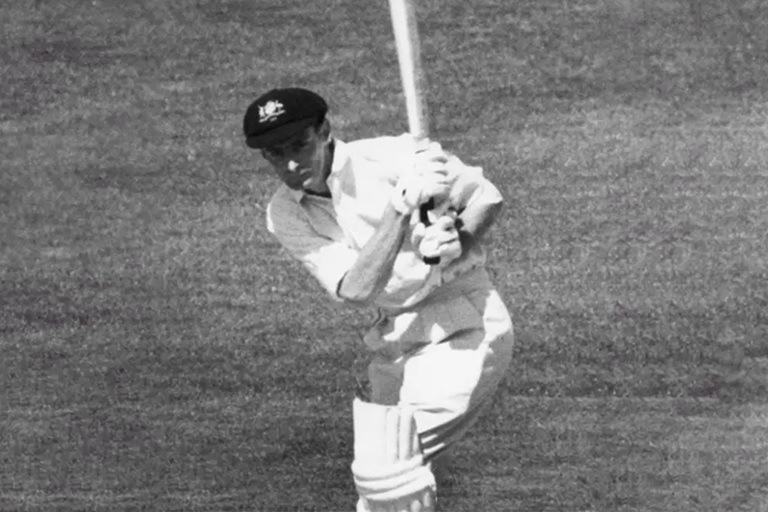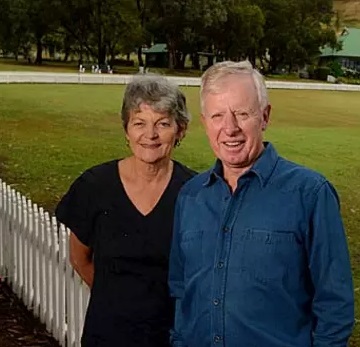"More Grace than the Princess of Monaco" - Brian Booth RIP
John Rogers | May 20, 2023

Every time I see Steve Smith go out at the fall of a wicket, whirring the bat around each shoulder, exercising every muscle he can think of, grabbing onto pad flaps, scratching out his mark as if digging to China, practising and re-practising forward defensives - I’m reminded of his absolute contrast to Brian Booth.
Brian walked out as if going fishing, so unobtrusively he often reached the crease before onlookers realised the was there. A half-smile on his face, he’d acknowledge anyone who said hello, he’d ask for ‘centre', if it was already marked, he felt no need to do it again, he'd settle comfortably over his bat and then to each delivery move back or forward with short, simple unhurried steps. Then in the purest style imaginable (see newspaper quote above) the runs would flow from his bat - without any extravagant “leaves” or headshaking. Minimalist Booth v Smith the Maximalist. Self-effacing v ostentatious. One thing they did have in common was a steely resolve. All over the cricket world, people had the impression Brian could be blown away by a bit of aggression. Not so.
He had a short backswing from his hockey days. In others that is often criticised, in Brian’s case it was celebrated. Like the greatest of players, he always seemed to have time to play the fastest deliveries and his bat always looked wider than anyone else’s. He played every shot in the book, except perhaps the hook - it was almost as if he didn’t need to and he’d score at will off anything else.
Yet to all those who played with and against him, his career in test cricket was remarkably short. He was 27 when he made his debut, some seven seasons after first being chosen for NSW. Supposedly with Bill Lawry he was the last person chosen for the 1961 Ashes tour of England. Each was to make his mark, Brian being given his chance in the 4th test in what turned out to be the Ashes decider, his debut 46 out of 190 in the 1st innings on a difficult pitch, signalling the arrival of a quality batsman.
Established in the test team, he returned to find no home test series, so had turned 29 before he played his first test in Australia. Over the next two Australian seasons - against England and South Africa - he averaged over 70 - putting himself in the ranks of the absolute highest and catapulting him to test vice-captain. A second Ashes tour of England in 1964 had him averaging 42 in the tests and on return he was to find an Australian summer with just one test - against test "newbie"s Pakistan. In the off-season came a tour of West Indies and after a century in the 2nd test, his form fell away, with the unorthodox action and blinding speed of Charlie Griffiths - publicly outed as a “chucker" by former captain and then journalist Richie Benaud - widely considered the main factor. Till then sheer pace had never worried him. On debut for NSW, he had faced up to “Typhoon” Tyson, on the Windies' famous 1960/61 tour he had opened against a young, lightning-quick Wes Hall on an SCG green-top, Freddie Trueman had worked him over in England and Peter Pollock could be fast and furious. Bouncers delivered by these last four he could duck under quite easily, but Charlie's "just seemed to follow me” he told friends.
Back in Australia, he found himself appointed captain for the 1st and 3rd Tests of an Ashes series as result of established captain Bob Simpson’s broken arm and then chickenpox. Captaincy was never something he aspired to, declining to captain his club team, St George, and only doing so for Australia because essentially there was no-one else. When Australia did badly, he was summarily dropped, never to play for Australia again and missing out by one test for a payout from the NSW Players Provident Fund. Ask any of his contemporaries - at Test, State and Club level - and they would rank him with the absolute best. But while Benaud, Davidson, Simpson, Lawry and others had test careers spanning close to 10 years, Brian had just 4 years at the top.
Many people say it was because he was “too nice”. It was too easy to drop him, make him 12th man, or move him around the batting order to accommodate others. He was never one to seek an extra opportunity or a rise in the batting order, or to complain if left out. He would simply smile, accept it and quietly set about playing at a lower level as before. When he gave up cricket for a year when selected to play hockey at the 1956 Melbourne Olympics, he wasn’t given a single game at the Olympics. He also had the misfortune too of having a string of young superstars appear with charisma that was not in his make-up. In the year before he made the NSW side as a 21-year-old, two 16 year olds in Ian Craig and Bob Simpson were the talk of Australia. Out of his own club and zooming past him, came Norm O’Neill, while Neil Marks and Graham Thomas put in debut appearances that once again had Brian sent back to club level. Then in his last year when captain, the young Doug Walters, whom he had helped nurture in the NSW side, did so well that effectively he ended Brian’s test career.
Whether too nice for his own good, there is no doubt he was one of the nicest people to play the game. I saw that at close hand as a ten-year team-mate at St George, where my no.4 spot in the batting order came immediately after Brian's at 1st drop. The club’s annual reports show that together we had 16 partnerships of over 50, the first of which occurred in the initial match of Brian’s last season of test cricket. Watching from the other end that day had me in complete awe as he moseyed to a century and then threw his innings away - he was happy for the youngsters to have a chance. I’m not sure that batting with him ever did me much good as the urge to keep the score moving, not to hog the strike, and not to look too much like a novice alongside him, sometimes had me trying to play above my skill level. Taking a single off the last ball of the over at times had me mortified. The crowd on the hill in my imagination were repeating the famous WG Grace quote: "They’ve not come to watch thee, laad!” All those thoughts fade away remembering the pleasure of being out in the centre with him. Brian typically would simply smile from the other end and nod to say, "don’t worry about it".
And could he field! At first, I didn’t realise it. Like his contemporaries, he wore cricket boots that were little better than today’s work-boots and somehow, they didn’t suit his style. Then one day, he swooped on a ball from cover-point and ran out a batsman by about 5 metres. I was amazed. Did Brian really do that? And when I began to look closely, I could see that he ranked with the very best. I read a quote recently that he was invited to be timed over 400 metres - and without any preparation whatsoever, astonished by clocking 50.8 seconds. Forever underrated was Brian.
He took the best slips catch I have ever witnessed - effectively winning a 1st grade premiership. On a wintry late-March Day at the Sydney Cricket Ground in that same 1965-66 season where he had turned the cricket world on its head, the young Doug Walters had reached 97 against us with just 40 runs to get. The ‘new ball' had just been taken by our feisty young quick, Peter Leslie, and to a short, rising delivery Dougie launched into his classic square cut that had torn the heart out of our bowlers that day. The new ball came off just a fraction faster and lifted a fraction higher, and instead of middling it, Dougie got a thick edge. The ball flew like a rocket directly between 1st and 2nd slip. At 1st slip, I’m afraid I didn’t move a muscle, nor did Brian at 2nd slip - until the very last moment when he flung out his left hand horizontally. The ball hit his hand like a rifle shot - and stuck. “I never saw it, but somehow I caught it,” Brian would often say, describing it as the best catch, he ever took. In a sense that day he’d turned the tables on Doug whose instant test success had meant no more tests for Brian. He had top-scored with 83, and then when the game looked lost, as a change bowler, he took Richie Benaud’s wicket (he was on 99) and next over took the Walters catch - the last two effectively snatching victory from the jaws of defeat.
His lifestyle choice as a non-drinker with firm Christian beliefs and strong family values - his wife Judy a life-long tower of strength - meant he was never one of the “boys” in the dressing room. It mattered nought - neither at national, state nor club level. Universally known as “Sam” (after a then-famous Salvation Army preacher Samuel William Booth), he'd sit there quietly and enjoy the banter with a smile on his face, always happy to participate if asked for a comment. Essentially, he was happy to play the game for the sheer enjoyment, and loved encouraging team-mates - but never wanted the responsibility of being captain. He’d played happily at St George for seven years under the captaincy of his best friend Warren Saunders when it became obvious via Bob Simpson’s injury, that he would be stand-in Australian captain. “Brian, I think you should take over as captain of St George before the Tests start,” Warren said in front of the team to Brian. "No thanks,” responded Brian firmly. “I’d rather be captain only when and if I have to,” came the reply. Many people have no doubt the responsibility of being Test Captain sat uneasily on his shoulders. On being dropped, he received a letter of commiseration from Chairman of Selectors Sir Donald Bradman - the only time Bradman ever wrote such a letter. Any disappointment Brian had, never showed. He played on at club level for another 12 seasons - for many grade cricketers, it was the highlight of the season to be in the field watching Brian Booth bat.
RIP Sam.








